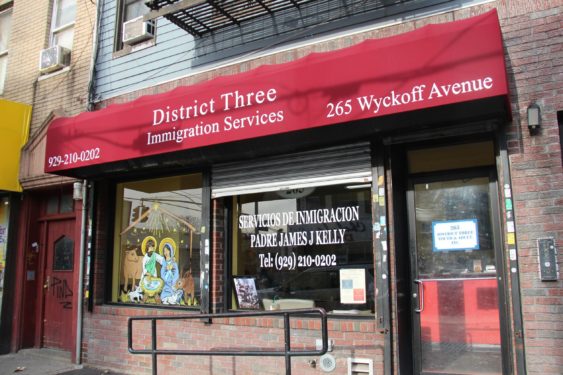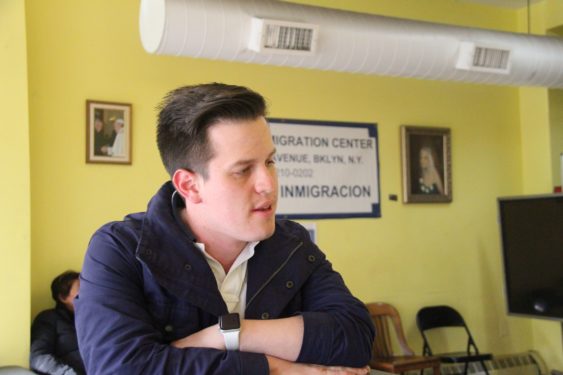
BUSHWICK — A U.S. Supreme Court vote has made it tougher for immigrants to enter and stay in the country, at least for now.
Its effects are reverberating locally at St. Brigid’s Immigration Services Center in Bushwick. The center, which is run by Msgr. James J. Kelly, an immigration attorney, helps immigrants with citizenship classes, employment forms, family petitions and legal advice.
On Jan. 27, the Supreme Court ruled that a Trump administration order that makes it easier for the government to block immigrants from obtaining admission into the United States, or gaining residency status, can be enforced until a final court ruling is issued.
Isaac Bustos, an immigrant from Ecuador who has lived in Brooklyn for about a year and who works at St. Brigid’s, has a green card, but says the Trump rule could affect him if he needs government benefits in the future.
“For me, I’m new in the country, I’m building myself, and even thinking about going back to school for international relations,” he said.
“At this point, I could use all the help I could get. But if I lost my job or got sick, or later if I decide to bring my family from Ecuador here, I would lose those benefits.”
Bustos also said that the ruling has a deep “psychological impact” on immigrants who may be trying to get relatives into the country.
“I believe that a country should give help to its citizens and the people inside, so that they could build the life they want to live, and this law makes it hard,” Bustos said. “I see it from the other side, but at the end of the day, I believe that policies should abide to the needs of hardworking citizens.”
Bishop Nicholas DiMarzio calls public assistance and benefits a “safety net” for immigrants in need.
“You can’t survive in our society today without some type of assistance; this is how we make a society work … It’s unfortunate because permanent residency is how we keep people on the road to citizenship. We can’t have an underclass in our society that can’t vote, that can’t take any benefits, but has to work, so it’s very unfair,” he told Currents News.
“It’s a very negative approach to immigration … We want to be concerned about people; that’s why we have laws, so that people will benefit. But when you’re looking to enforce them against certain classes or types of people, then you have to really reconsider.”
But the court’s order is a “massive win for American taxpayers, American workers and the American Constitution,” the White House Press Secretary said in a statement.

“This decision allows the government to implement regulations effectuating longstanding federal law that newcomers to this country must be financially self-sufficient,” the White House said.
In a statement, Gov. Andrew Cuomo called the ruling “deeply disturbing,” saying it “will only further embolden the federal government’s relentless assault on immigrants throughout the country …
“We are a nation of immigrants, and it is abhorrent to our values as Americans and as New Yorkers to discourage those who are most in need of seeking refuge and assistance on our shores.”
Father Patrick J. Keating, CEO of Catholic Migration Services, reminded immigrants that the ruling “does not mean everyone should stop receiving any public benefits that they need for their family.”
“It is also important to note that there is no ‘public charge’ test for green card holders who apply for citizenship. Please know that many will continue fighting against the ‘public charge’ rule and the litigation is not over,” Father Keating said in a statement. “Therefore, before withdrawing from any public benefits you are currently receiving, we [CMS] encourage you to speak with a trusted immigration attorney.”
The meaning of what constitutes a “public charge” is part of the issue in the Trump case. Under one understanding, a public charge is someone who relies primarily on government assistance long term. The Trump administration defines public charge more narrowly, saying factors such as age, income and health can be used to determine whether someone is a public charge.
Catholic paralegal Richard Reinoso said the ruling is creating an “electronic barrier” for hardworking immigrants who contribute to the nation’s livelihood and economy.
“We must remember that America was built for the poor, huddled masses,” Reinoso said. “We should not discriminate against anybody based on their luck or wealth.”
